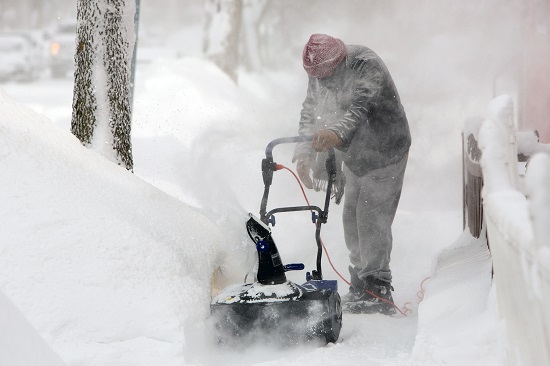
Story of the Week... Opinion of the Week... Toon of the Week... Coming Soon on SkS... Climate Feedback Reviews... SkS Week in Review... Poster of the Week...

In the summer, when heat waves scorch cities or heavy rains flood the coasts, some climate scientists and environmentalists will point out any plausible connections to global warming, hoping today’s weather will help people understand tomorrow’s danger from climate change.
Then winter comes. And, like clockwork, those who want to deny the established science that humans are warming the planet will try to flip the script. In January, when large swaths of the country were gripped by bitter cold, President Trump took to Twitter to mock climate fears: “Wouldn’t be bad to have a little of that good old fashioned Global Warming right now!”
Welcome to the weather wars. As battle lines harden between climate advocates and deniers, both are increasingly using bouts of extreme weather as a weapon to try to win people to their side. Weather, after all, is one of the easiest things for people to bond over or gripe about, a staple of small talk and shared experience that can make it a simple but powerful opportunity to discuss global warming.
But, as Mr. Trump’s words show, it’s also a framing device that can be easily abused. That raises the stakes for how scientists, who have long tried to distinguish between short-term weather fluctuations and long-term climate shifts, draw out and discuss the links between the two.
How the Weather Gets Weaponized in Climate Change Messaging by Brad Plumer, Climate, New York Times, Mar 1, 2019
The resolution’s focus on climate and social justice highlights the central challenges—and opportunities—of our time
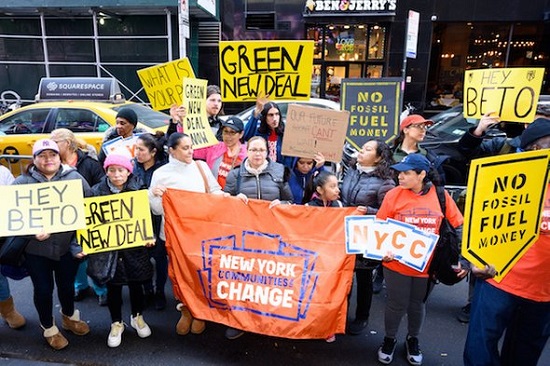
When Representative Alexandria Ocasio-Cortez and Senator Ed Markey introduced the Green New Deal (GND) resolution on February 7, 2019, many climate advocates rejoiced. From the Union of Concerned Scientists to the League of Conservation Voters, advocates representing a diversity of interests recognized that, finally, a resolution had been introduced into both chambers of Congress with an ambition that matched the scale of the climate-change challenge. The resolution presents a broad vision of what climate action in the United States could look like, centering the economy and jobs, especially for working class people.Meanwhile critics, both of the well-intentioned and bad-faith sorts, lambast the resolution for being unrealistic, falling short, being too vague or too costly.
With so many voices in the GND debate, one that is conspicuously silent is the voice of the scientific community. We urge scientists to engage in the discussion, both with their scientific expertise and as citizens.
As we wrote two years ago:
“We are women and scientists who strongly believe in the power of scientific solutions to change lives for the better, particularly those of other women and marginalized groups. Our goal is to use our knowledge, expertise, and experience as scientists to highlight the unique challenges faced by women around the world in the face of climate change, and propose policy and grassroots actions to address these challenges.”
The GND is galvanizing a movement around these very ideals and we see a critical role for scientists, and for women scientists in particular, in how the GND resolution is enacted. Here is why:
Scientists Must Speak Up for the Green New Deal, Opinion by The 500 Women Scientists Leadership,, Observation, Scientific American, Feb 25, 2019
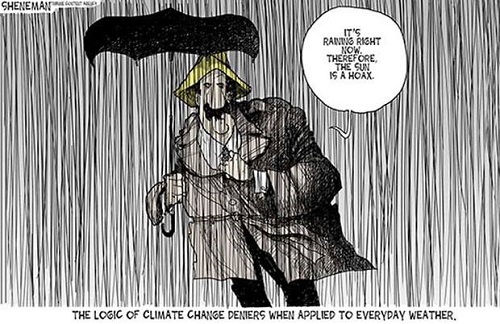
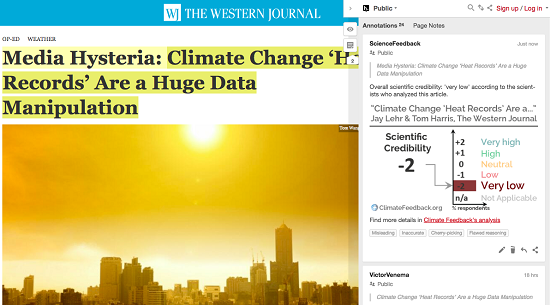
Climate Feedback asked a team of scientists to review the article, Media Hysteria: Climate Change ‘Heat Records’ Are a Huge Data Manipulation by Jay Lehr & Tom Harris, The Western Journal, Feb 20, 2019
Three scientists analyzed the article and estimate its overall scientific credibility to be 'very low'.
A majority of reviewers tagged the article as: Cherry-picking, Flawed Reasoning, Inaccurate, and Misleading.
This op-ed published by The Western Journal, written by two members of think tanks opposed to the conclusions of climate science, makes several different types of claims about global temperatures and global temperature data. The authors attempt to argue that global temperatures are not increasing by cherry-picking some local examples of weather extremes. The headline further claims that temperature data have been “manipulated”.
Scientists who reviewed the article found that it provided no support for any of its claims, which contradict existing research and data analysis.The argument it attempts to make suffers from flawed reasoning, pretending that a cold record at some location decades ago would mean that the last few years of global average temperatures haven’t been the warmest on record.
The reviewers indicated that the content of the article does not support its headline.
UPDATE (26 February 2019) The Western Journal has retracted this op-ed, providing the following message in its place: “This Op-Ed has been retracted for failing to meet The Western Journal’s Editorial Standards. After publication, a number of factual claims made in the Op-Ed were determined to have been untrue. The decision was then made to retract the piece. Before we had done that, questions were raised about the methodology used by its authors to reach their conclusions, but because the decision to retract had already been made, The Western Journal did not investigate the validity of those questions. We note them here only for the record.
We apologize for publishing material in violation of our Editorial Standards of factual accuracy and for any confusion we might have caused by doing so.”
You can read an archived copy of the op-ed here.
Western Journal op-ed deceives readers with completely unsupported claims, Edited by Scott Johnson, Climate Feedback, Feb 26, 2019
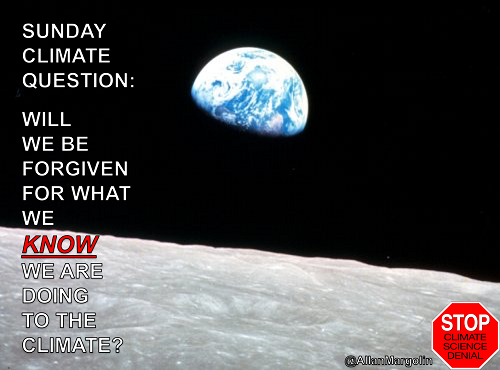
Posted by John Hartz on Sunday, 3 March, 2019
 |
The Skeptical Science website by Skeptical Science is licensed under a Creative Commons Attribution 3.0 Unported License. |